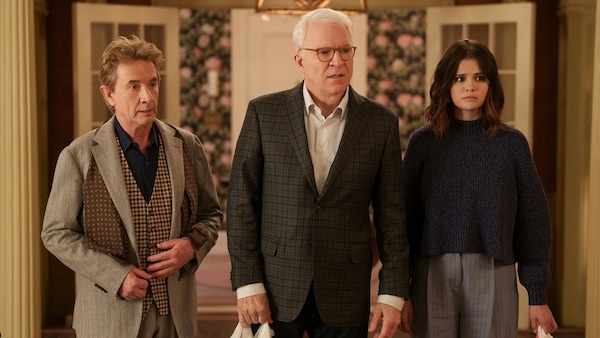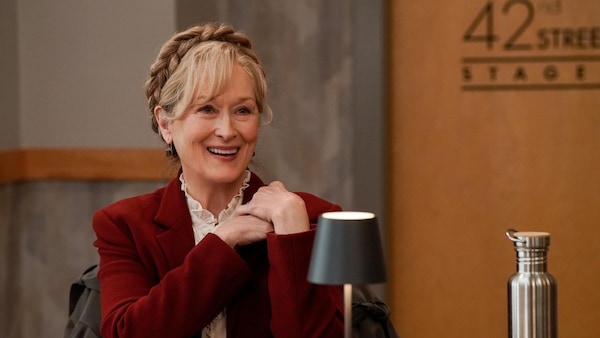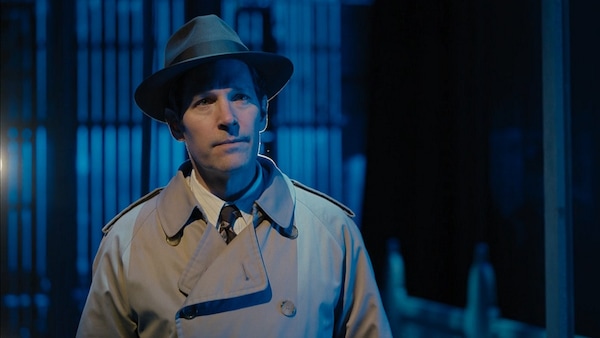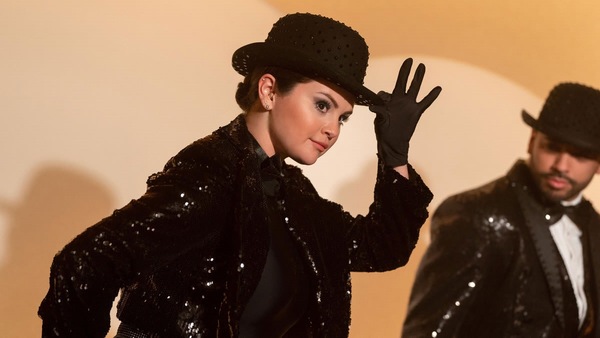Only Murders In The Building S3: The Whodunit's An Afterthought
Does Only Murders in the Building secure a three-peat? The answer is both yes and no, writes Prahlad Srihari.

Last Updated: 12.16 PM, Aug 25, 2023
This column was originally published as part of our newsletter The Daily Show on August 24, 2023. Subscribe here. (We're awesome about not spamming your inbox!)
***
THERE is a Latin dictum, “omne trium perfectum”, meaning everything that comes in threes is perfect. Ancient Romans put the principle to practice. Julius Caesar loved to declare, “Veni, vidi, vici.” His avenger Mark Antony, as per Shakespeare, appealed to the crowd’s emotions with “Friends, Romans, Countrymen.” In ancient Greece, Aristotle was quite persuaded by the appeals of logos, pathos and ethos. For Freud, it was id, ego and superego. For Ian Dury, it was sex, drugs and rock ‘n’ roll. Stories are traditionally made up of a beginning, middle and end. Comedians swear by the rule of three. Musketeers, Blind Mice, Little Pigs, Stooges, Amigos — all came in threes.
Three years ago, two of those Three Amigos, Steve Martin and Martin Short, teamed up afresh with popstar Selena Gomez as neighbours-turned-sleuths-turned-buddies in Only Murders in the Building. For two seasons, we were treated to the winsome threesome of murder, mystery and mirth in Manhattan. Entering Season 3, the show triangulates around a musical. Even if a show manages to avoid the sophomore jitters, Season 3 is always tricky because it can make or break its reputation. One sets the tone. Two ups the stakes. Three straddles the tricky line between a couple and one too many. It’s when viewers expect something different, something bolder, something that anticipates our expectations and turns them back on us. Does Only Murders in the Building secure a three-peat? From the eight (out of 10) episodes provided to press, the answer is both a yes and a no. Yes, largely because we get more Martin Short, more jokey namedrops, more zingers with sting. No, because the whodunit, for a second straight season, feels like an afterthought — an extra serving of dip to go with the meal, rather than the meal itself.

As with the first outing, the second too drew the curtains after a deathly cliff-hanger. Only with a murder outside the building. Oliver Putnam’s (Short) long-awaited Broadway comeback as director is interrupted by the production’s leading man Ben Glenroy (Paul Rudd) seemingly dropping dead on stage. On opening night. The first twist of Season 3 puts to rest every concern over the scene of the crime not being in the building. Ben somehow survives the poisoning. Not too long after crashing a mournful premiere after-party, he is however pushed down the elevator shaft of the Arconia — setting up the next whodunit for Oliver, Charles-Haden Savage (Martin) and Mabel Mora (Gomez) to solve and turn into a fresh batch of podcast episodes.
Needless to say, Rudd is a crackerjack addition to the ensemble this season, but the marquee guest is of course Meryl Streep. Season 3 drops us first not into a production of Oliver’s play “Death Rattle,” but a production of Richard Rodgers’ 1962 musical “No Strings,” seen through the transfixed eyes of a young girl named Loretta who falls in love with the stage instantly but endures a career of rejections, near-misses and bit roles. At the end of the montage, the now much older Loretta (Streep) walks onto the stage to audition for the role of the Nanny in “Death Rattle,” still hoping for her big break and still hoping to hear an awestruck director wonder aloud, “Where have you been?” That awestruck director turns out to be Oliver, who stands up, walks up to her and practically hands her the role. The most lauded actress of Hollywood in our lifetime playing a struggling actress who spends a lifetime waiting to be discovered is a priceless casting gag. For every Streep who makes it, there are dozens of Lorettas who don’t. The thin line that separates success and failure, realised and unrealised talent, reveals the fickle and fortuitous nature of the industry.

Oliver, Charles and Mabel — like Loretta — are all looking for another shot. “Death Rattle” presents Oliver a chance at a directorial comeback after a disastrous flop ruined his career and his legacy. Joy (Andrea Martin) presents Charles another chance at love. As for Mabel, she is not sure if true-crime podcasting is a career she wants to pursue or if it is just something she fell into because of all the murders at her temporary residence? Being the youngest, Mabel has the most figuring-out to do. The message, in this season of dreamers and late bloomers, is it’s only too late if you don’t start now.
As Ben, Rudd channels that Hollywood hotshot douchebaggery that would make anyone in the production want to kill him. In other words, the perfect victim. Among the suspects are: the touchy-feely mother-son producing duo Donna (Linda Emond) and Cliff Demeo (Wesley Taylor) who grew tired of their A-list star’s endless requirements; co-star and TikTok influencer Kimber (Ashley Park) who didn’t like being in his shadow; Ben’s put-upon assistant brother Dickie (Jeremy Shamos); the understudy Jonathan (Jason Veasey); the obsessed stalker Gregg (Adrian Martinez); Ben’s behind-the-scenes documentarian Tobert (Jesse Williams); and last but not the least, Loretta, whom Ben referred to as a “snake”.
While most of the secondary characters just make up the numbers, the show on occasion does unlock fresh perspectives to extend complexity beyond the binary of suspect and victim (like with Theo in Season 1 and Bunny in Season 2). The flipside is time spent with the other characters on screen takes the focus away from Oliver, Charles and Mabel. All three complement and contrast each other so well, their back and forth is what makes the show sing. Short remains a boisterous delight as Oliver, a showman whose passion far outstrips his talent. Pomposity has seldom come in such an affable package. Martin can switch between goofy antics and angsty vulnerability at the drop of a hat. Gomez’s late-bloomer ennui (or “old lady energy” as Oliver calls it) brings balance to the odd-couple pairing of Short and Martin. If two evokes a duality, three restores unity via trinity. With each season, Gomez has grown more comfortable asserting her presence as the third lead.

Whodunit or who didn’t, Oliver revives the cast’s show-must-go-on spirit by transforming the play into a splashy musical. “Death Rattle Dazzle,” he calls it on the suggestion, “Why does murder always have to be such a dreary business?” Co-creator and showrunner John Hoffman brings an unbridled attitude to the staging of Oliver’s revamped production, throwing all kinds of theatrical in-jokes at the screen. One visual gag sees Charles get so stressed about performing a patter song (a Gilbert and Sullivan-style up-tempo comic routine), he blacks out and ends up in a white room. One dream sequence sees Mabel, Charles, and Oliver’s son Will (Ryan Broussard), put on a song-and-dance number — a clear homage to “All That Jazz” — after Oliver calls his heart attack a rite of passage in theatre. “Bob Fosse had, like, five,” he reasons. Leave it to Oliver to find a way to wedge a famous name into a conversation about heart attacks.
Each of the central trio goes on their own journeys this season. Charles’ own inhibitions and a past girlfriend turning out to be a killer make him suspicious of Joy, and leave him wondering if he is meant to be alone. Oliver is so desperate to make his Broadway comeback a triumph he is willing to ignore the possibility that Ben’s killer may be one of his cast members. This leaves Mabel chasing clues by herself or with whoever is ready to help her. In previous outings, momentum came from the trio’s pursuit of leads for their podcast. Even as it piled on the misadventures and misdirects, the show stayed rooted in the sleuthing podcasters’ ability to work together as a unit. The joy was in the tag-along. With the trio split up for large chunks of the runtime and our attention divided, Season 3 is forced to drive forward virtually without its engine. In one of many self-aware moments from the show’s last outing, Oliver says, “You can tell this is our second season.” The same could be said of this instalment: You can tell this is the third season. Contrary to what the Latin dictum states, everything that comes in threes is not always perfect.
